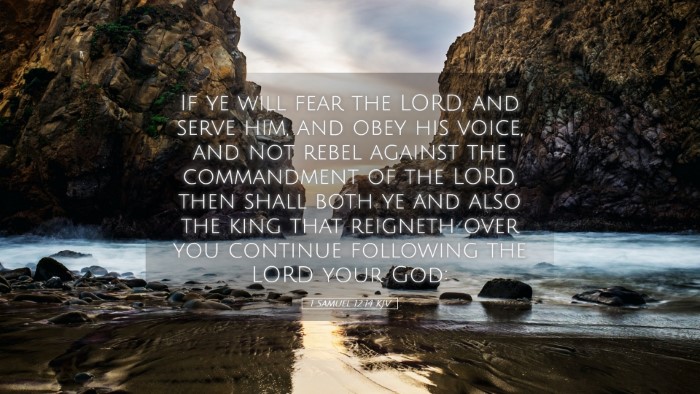Commentary on 1 Samuel 12:14
Verse Text: "If you will fear the Lord, and serve him, and obey his voice, and not rebel against the commandment of the Lord, then shall both you, and also the king that reigns over you, continue following the Lord your God."
This verse is a pivotal moment in the narrative of Israel’s history, highlighting the conditions for divine favor and the consequences of spiritual fidelity.
Contextual Background
The words of Samuel here are addressed to the Israelites after they demanded a king. This marks a transition from a theocracy ruled directly by divine authority to a monarchy. Samuel, as the prophet and leader, emphasizes the importance of maintaining their covenant relationship with God, even in the face of their new governance structure.
Exegetical Insights
Fear of the Lord
Samuel begins with the concept of fearing the Lord. This phrase embodies an attitude of reverence and awe towards God. Albert Barnes remarks on the seriousness of this fear, which is necessary for a vibrant faith. It underscores the relationship between human conduct and divine authority.
Serving and Obeying
The call to serve the Lord and obey His voice indicates that true kingship under God leads to active engagement in worship and obedience to divine commandments. Adam Clarke notes that serving God reflects a willingness to act according to His will. The obedience mentioned is active rather than passive, initiating a faithful partnership with the divine.
Rebellion Against Commandments
Rebellion is shown as the antithesis of the response the Lord expects. Matthew Henry comments on the perpetual struggle against disobedience, indicating that the Israelites’ history reflects a pattern of turning away from God's commands. Acknowledging this cycle is vital to understanding the theological implications of this admonition.
Theological Reflections
Covenant Responsibility
This verse encapsulates the idea of covenant responsibility. The people are reminded that their right relationship with God is not solely in the hands of their earthly king, but is contingent upon their collective fidelity to God’s will.
Spiritual Leadership
The dual mention of the people and their king highlights the shared responsibility of both the governed and the governor. Spiritual leadership must align with God’s commandments, reminding us that both leaders and followers are accountable to God.
Continuity of Divine Favor
The promise of continuing with the Lord carries significant weight. As long as the Israelites adhere to these stipulations, they will experience God's favor. Barnes suggests that this offer of continued relationship is not merely transactional but indicative of a vibrant faith life sustained by mutual commitment.
Practical Applications
Life of Obedience
For pastors and theologians, this verse calls for an examination of contemporary practices concerning obedience and fear of the Lord within their congregations. A life characterized by active obedience to God’s word creates a flourishing community of faith.
Leadership Dynamics
Leaders should reflect on how their example affects the faithfulness of those they lead. The correlation between the king and his subjects illustrates the impact of leadership on the collective spiritual condition of a community.
Contemporary Relevance
In today's societal context, the challenge remains to uphold divine commandments amidst cultural pressures. Henry suggests that resisting rebellion is a modern call to action, championing fidelity to divine mandates against a backdrop of competing values.
Conclusion
1 Samuel 12:14 serves as a reminder of the enduring nature of God’s expectations and the blessings tied to obedience. It challenges believers to examine their fear of the Lord and their commitment to living according to His commands, reaffirming that both individuals and leaders are accountable to God. The practices of reverence, service, and obedience shape not only personal faith but the communal life of the church.


